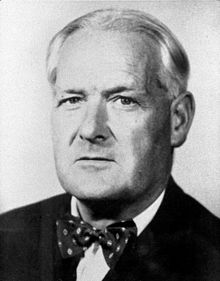Austin Bradford Hill
| Austin Bradford Hill | |
|---|---|
 |
|
| Born | 8 July 1897 |
| Died | 18 April 1991 (aged 93) |
| Nationality | United Kingdom |
| Occupation |
Epidemiologist statistician |
| Known for | "Bradford Hill" criteria |
| Awards | Guy Medal (Gold, 1953) |
Sir Austin Bradford Hill FRS (8 July 1897 – 18 April 1991), English epidemiologist and statistician, pioneered the randomized clinical trial and, together with Richard Doll, demonstrated the connection between cigarette smoking and lung cancer. Hill is widely known for pioneering the "Bradford Hill" criteria for determining a causal association.
Son of Sir Leonard Erskine Hill FRS a distinguished physiologist, Hill was born in London, lived as a child at the family home, Osborne House, Loughton, Essex; he was educated at Chigwell School, Essex. He served as a pilot in the First World War but was invalided out when he contracted tuberculosis. Two years in hospital and two years of convalescence put a medical qualification out of the question and he took a degree in economics by correspondence at London University.
In 1922 Hill went to work for the Industry Fatigue Research Board. He was associated with the medical statistician Major Greenwood and, to improve his statistical knowledge, Hill attended lectures by Karl Pearson. When Greenwood accepted a chair at the newly formed London School of Hygiene and Tropical Medicine, Hill moved with him, becoming Reader in Epidemiology and Vital Statistics in 1933 and Professor of Medical Statistics in 1947.
...
Wikipedia
